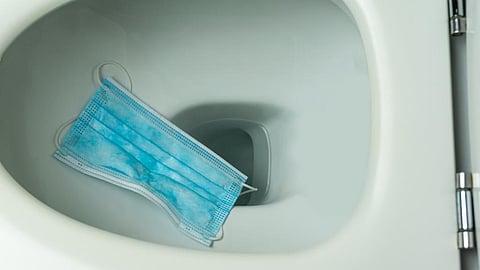How flushing down COVID-19 waste can pose a serious threat
People disposing all kinds of solid waste such as toilet paper, diapers, tampons and condoms into the toilet bowl and chocking up sewer networks is a problem that has persisted for years.
The blockages take up extra person-hours, machinery and equipment, and increase the cost of waste treatment.
It is difficult to treat septage and sewage with non-biodegradable waste present in it. Solid waste, thus, needs to be filtered out before entering sewage treatment plants or faecal sludge treatment plants since these are designed to treat specific type of waste.
The problem has taken a more serious shape amid the novel coronavirus disease (COVID-19) pandemic. COVID-19 waste including gloves, medicines and masks, can stoke contagion rates. Pollution caused by it will be one of the biggest challenges in the upcoming years.
Flushing down such waste, especially fibrous face masks, will not only add to the volume of solid matter in the sewerage but also choke the local wastewater and sanitation network.
Also, some studies have shown presence of SARS-CoV-2 in wastewater, for which the source is unknown. This could come from the mucus, cough or sneezing, stool or urine of COVID-19 patients.
Not only off-site sanitation systems such as sewer networks but on-site sanitation systems such as soak pit latrines, twin pit latrines and septic tanks may also be affected.
A Japanese study done by the Toyama Prefectural University, Kanazawa University and Kyoto University confirmed the presence of the virus in the wastewater plants of four treatment plants in Ishikawa and Toyama prefectures in western Japan.
The researchers analysed 27 samples of wastewater out of which seven were found with the virus. Wastewater testing could be helpful in estimating the number of infected people in a region without testing every individual, the researchers said.
The report said:
The detection frequency remained high even after increase in the number of cases stopped, presumably due to shedding from discharged or undiagnosed individuals.
There is need for safe collection, transportation, disposal and treatment of COVID-19 solid waste along with municipal solid waste in any city or village in order to prevent it from being flushed down and collapsing sewer drainage.
Moreover, detection of presence of SARS-COV-2 in wastewater and sewerage in India is the need of the hour.


